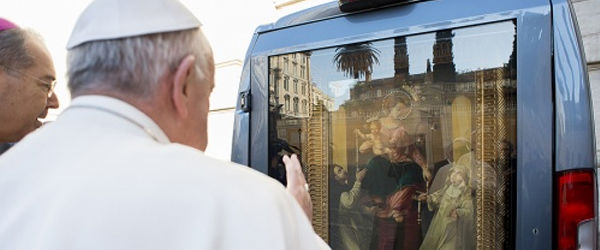The contraceptive mandate in the new health reform law is constitutional but the religious exemption to it represents an unconstitutional intrusion by government into decisions about religion, according to the former chairman of the U.S. bishops' Committee on Catholic Education.Speaking March 15 at The Catholic University of America on "Religious Liberty, Conscience and Contraception," Auxiliary Bishop Thomas J. Curry of Los Angeles traced the current controversy over the Department of Health and Human Services' requirement that most religious employers provide free contraceptives through their health insurance plans to misinterpretations of the First Amendment by politicians, courts and the public.
"If one were to set out to write a law in violation of the First Amendment, to write a regulation giving power to government in religious matters, one would be challenged to come up with a better sample than this exemption," he said.
The HHS mandate and its narrow religious exemption have prompted protests led by the U.S. Catholic bishops, who say requiring people to pay for drugs and procedures contrary to their moral beliefs is a violation of religious freedom.
The Irish-born Bishop Curry, who holds a master's degree in history and a doctorate in political science from U.S. universities, said the controversy "has brought to light a problem that has been growing by leaps and bounds in recent years --- the interference of government in religion."
He said the "wall of separation between church and state" --- not mentioned in the First Amendment but part of the Supreme Court's 1947 decision in Everson v. Board of Education --- has been subject to the government's interpretation about where the separation should occur, constituting an impermissible breach of the constitutional requirement that the government stay out of religion.
If one were to set out to write a law in violation of the First Amendment, to write a regulation giving power to government in religious matters, one would be challenged to come up with a better sample than this exemption.---Bishop Thomas Curry on the HHS requirement that most religious employers provide free contraceptives
He said the framers of the Constitution and the Bill of Rights made clear that the First Amendment meant "that the government has been given no power in religious matters," but over the years the Supreme Court has turned that on its head by setting up a test that asks whether "a law aids, hinders or is neutral toward religion."
"The test is impossible and completely arbitrary and unconstitutional in that it makes religion the focus of the law, not the power of government," Bishop Curry said, adding that the Supreme Court "has wisely ignored it in practice."
To judge the HHS mandate by that test does not resolve the debate, he added, because "the Catholic Church says it hinders its religion. Other churches see it as helpful. Others don't care one way or the other."
Neither can religious freedom be interpreted as the freedom to follow one's conscience no matter where it leads, Bishop Curry said. "A guarantee of individual conscience could well be a source of anarchy --- there are probably very few laws in the country that someone does not object to in conscience," he said.
The bishop said the "principal reason" that Americans have been "so willing to accept the power of government in religion despite the prohibition of the First Amendment is the heritage of anti-Catholicism," demonstrated most clearly in the Blaine Amendments passed by 37 states in the late 1800s.
The amendments "focused on prohibiting aid to religion, i.e., Catholicism," he said. "They reverse the thrust and purpose of the First Amendment which was enacted to affirm that the government has no power in religion."
"This has led to the present situation wherein limitations on the government power have receded and people assume that the state has all power over religion," Bishop Curry said. "The exception to the mandate seems to give evidence that generally our society is willing to give the government very extensive power to define the meaning of religious values and to say who is following the tenets of a particular religion."
Today's challenge "is to keep government out of making religious decisions such as who is inculcating religious values and who is following the tenets of a religion," he added. "Our challenge furthermore is to understand the actual decisions of the court, to see how they ignore the rhetoric that surrounds them and to bring the justification of the court's decisions in harmony with its actual decisions."
---CNS
{gallery width=100 height=100}gallery/2012/0323/curry/{/gallery}

